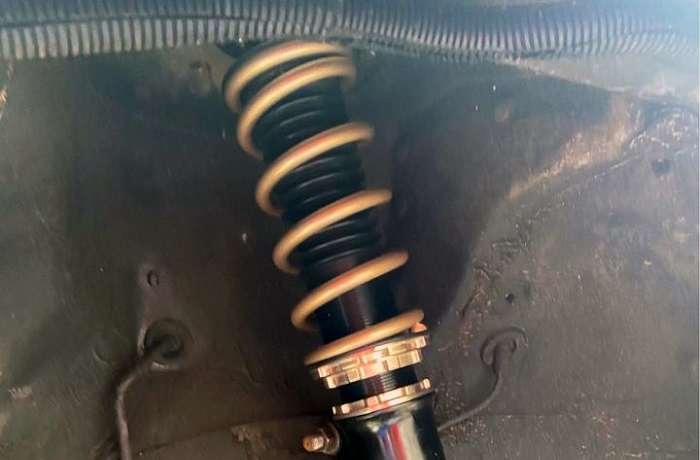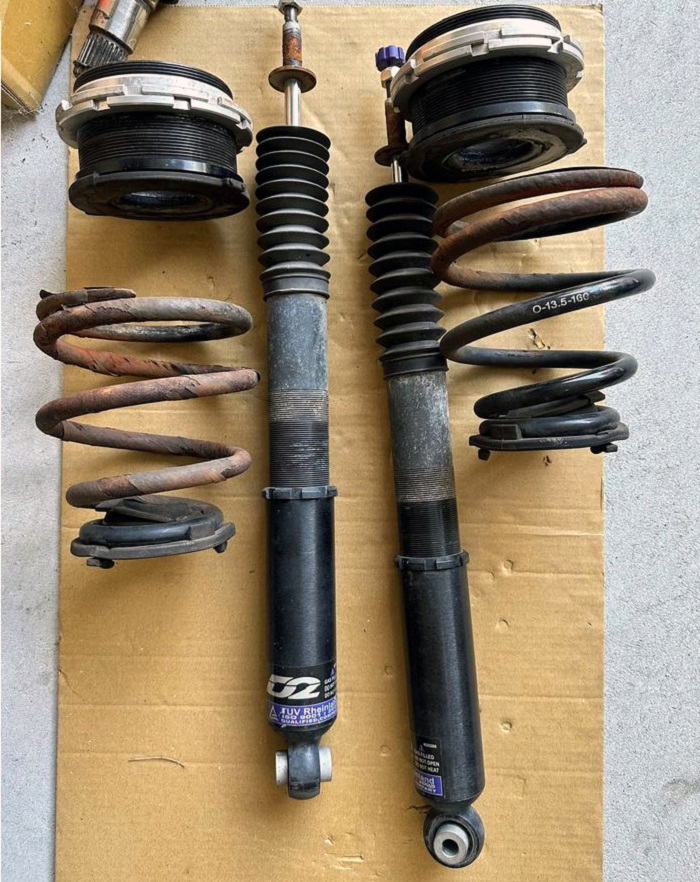Coilover suspensions are increasingly becoming popular among car enthusiasts. One of the reasons behind that is the feature that enables the DIY adjustment of ground clearance by using the screw thread.
Besides its impressive features, like all other types of suspensions, coilovers are also vulnerable to issues such as the production of a squeaking sound when driving over bumps.
In today’s post, I’ll be looking into what causes coilovers to squeak over bumps, the best remedy, and everything else you may need to know about this problem.

Table of Contents
- Is It Normal for Coilovers to Squeak Over Bumps?
- What Causes Coilover Squeaking Over Bumps?
- How to Diagnose Squeaky Coilovers?
- How to Fix Coilovers That Are Squeaking Over Bumps?
- Do Coilovers Squeak When New? (Do They Need to Settle In?)
- Is Squeaking a Sign of a Damaged Coilover?
- What Other Sounds Can Coilovers Make Over Bumps?
- How Long Can Coilovers Last Before They Start Squeaking?
Is It Normal for Coilovers to Squeak Over Bumps?
Coilovers are designed to work silently most of the time. If they were installed correctly, then you should only hear some squeaking when you drive over bumps at high speeds or whenever you overwork them.
However, if every time you pass over a bump you hear some squeaking, then something is wrong.
An occasional squeak from coilovers is normal. But if it’s excessive, then that should raise some concerns. I always advise my readers to act as soon as they start noticing the funny sounds. As that can save you a lot of money on repairs.
What Causes Coilover Squeaking Over Bumps?
There are a few culprits that could be behind this issue. I am going to list the most common ones that may be affecting your coilovers.
1. Lack of Lubrication
This is by far the leading cause of a squeaky coilover. If you look at the anatomy of a coilover, you’ll notice that there are several moving parts. When these parts come into contact, some friction is produced which creates a squeaky sound.
Spraying some lubricant over a coilover can easily put a stop to this problem. But make sure you use a lubricant that has been recommended by the manufacturer.
2. Accumulation of Dirt, Debris, or Rust
Contrary to what most car owners think, squeaky sounds do not always mean that the coilovers are damaged. In some instances, dirt and debris may have built up on the moving parts and causing squeaking when you drive over bumps.
The same also applies to corrosion. Rust buildup can also lead to a squeaky coilover. You need to be very careful with rust, especially if you live along the salt belt.
3. Wear and Tear
Like other parts of your car’s suspension, after a while, coilovers do experience wear and tear. This will happen much sooner if you are always driving on rough and bumpy terrains. However, in city cars, coilovers take longer to experience wear.
4. Poor Installation
If your coilovers are relatively new and you’re hearing some excessive squeaking, then there is a high chance that they were not installed correctly. If the coilovers were not properly mounted or torqued, you should expect some squeaking.
5. Using Low-Quality Coilovers
The other thing is that not all coilovers are built equally. Some brands make inferior coilovers that can’t withstand the pressure of driving through bumps. If you install such a coilover, it may squeak more than usual.
6. Accidents
Cars that have been involved in accidents and especially if the suspension was heavily affected, the coilovers may have been bent during the incident. And that can cause it to produce a squeaky sound whenever you drive over bumps.
How to Diagnose Squeaky Coilovers?
The first step when it comes to diagnosing a squeaky coilover is by listening to where the noise is coming from. Find a quiet road with several speed bumps.
Then with all your windows opened and the car radio muted, drive over these bumps and pay attention to where the noise is coming from.
Proceed to perform a visual inspection of the affected coilover and look for signs of damage, wear, dirt, or rust. This is usually enough to diagnose a squeaky coilover.
If the above method doesn’t bear any fruit, feel free to take your car to a mechanic for an expert diagnosis.

How to Fix Coilovers That Are Squeaking Over Bumps?
When it comes to fixing squeaking coilovers, you have to know what you are up against. For instance, if it’s been a while since you cleaned them, then you have dirt and debris to blame for the squeakiness.
Grab some car wash shampoo and get to cleaning. Don’t forget to lubricate them once you’re done.
Also, if you have been driving your car for years with the same coilovers, then it’s high time you replace them due to wear and tear.
The same applies to coilovers that were damaged during an accident. As for coilovers that were poorly installed, I’d advise you to make a trip to a professional mechanic and let them mount this suspension part on your car correctly.
I hope you can see why it’s important to identify the root cause of squeakiness in your coilovers.
Do Coilovers Squeak When New? (Do They Need to Settle In?)
Coilovers have a “settling-in” period. And during this time, you may notice some squeaky and clicking sounds as the different parts settle into their new position.
As mentioned earlier, coilovers are made up of moving parts. After installation, these parts may need some time to get used to rubbing against one another.
So, if your coilovers are relatively new, expect to hear some squeaking which should last for about a week or two, depending on your driving patterns.
However, prolonged squeakiness in new coils is a sign that either they were not lubricated during assembly or the installation was done poorly. Therefore, this is something you need to pay close attention to.
Is Squeaking a Sign of a Damaged Coilover?
Not really. There is a false narrative running around car forums that funny noises always indicate damaged coilovers.
From the list of causes I have shared earlier, factors such as dirt, debris, and lack of lubrication can also make coilovers squeak when driving over bumps.
Never be in a rush to conclude that a coilover is damaged without visually inspecting it. Because otherwise, you may end up spending a lot of money replacing a coilover that was in good condition, only that it needed some cleanup and maintenance.
The only sign of a damaged coilover is if it’s bent or warped. Another tip that I’d like to share with you is that, even though squeaking doesn’t always mean a coilover is damaged, it’s a sign that should be taken seriously.
If ignored for long, this squeakiness can lead to further complications later on.
What Other Sounds Can Coilovers Make Over Bumps?
Squeaking isn’t the only type of sound that can come from a coilover when it’s being driven over a bump. For example, if it is damaged, it may produce a clunking sound.
Also, if a coilover undergoes sudden changes, you may hear a popping sound followed by a rubbing or scraping noise. Rattling sounds are very common in coilovers that were poorly installed.
As you can see, different types of sounds signal varying coilover issues. Familiarizing yourself with such can be pretty useful in helping you diagnose various coilover problems.
How Long Can Coilovers Last Before They Start Squeaking?
Squeakiness caused by wear and tear will often occur from 50,000 miles to around 100,000 miles. This applies to high-quality coilovers. If you are using low-end models, you can expect them to start squeaking after 10,000 miles.
Please note that this period varies significantly depending on your driving habits and the level of maintenance you offer to the coilovers.
Drivers who are always hitting curbs and potholes are most likely to notice squeakiness in their coilovers earlier than usual.
